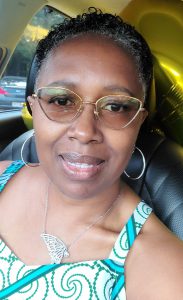World Cancer Day: Let’s Talk Openly About Cancer
Posted on by
Sterling Hill
Health Communication Specialist Contractor
Division of Cancer Prevention and Control
February 4 is World Cancer Day, when the world unites to raise awareness, improve education, and inspire action to reduce cancer. The observance is organized by the Union for International Cancer Control, which reminds us that “Talking openly about cancer and our experiences makes a huge difference in increasing understanding, overcoming stigma, and reducing fear.”
CDC’s Andrea Middlebrooks shares her story of overcoming breast cancer with help from her friends and family. Andrea is deputy chief of the Epidemiology and Applied Research Branch in CDC’s Division of Cancer Prevention and Control.
In January of 2012, Andrea noticed that the nipple on her right breast was starting to become inverted. She had a routine mammogram the next month. Afterward, her doctor called her back for another mammogram because she noticed something unusual on the first mammogram.
Although the doctor didn’t find cancer on the second mammogram, Andrea was worried. So, a month later, she made an appointment to see a breast specialist. The specialist did another test and told Andrea that cysts (fluid-filled sacs) were causing her symptoms. She drained fluid from several cysts and asked Andrea to come back for a checkup in 2 months.
When Andrea returned in June, her nipple looked the same. The doctor examined her breasts and said the tissue seemed thicker than normal. The doctor took a small sample of breast tissue (called a biopsy) to look at under a microscope. The doctor also ordered another test, called a positron emission tomography (PET) scan.
In July, Andrea was finally diagnosed with invasive lobular carcinoma, a type of breast cancer that begins in the glands that produce milk. “It took 7 months of testing and worry before I was diagnosed,” Andrea said.
“It Takes a Village”
Andrea’s husband, children, other family members, and friends helped her though cancer treatment. “The saying ‘it takes a village’ rang true as far as my support system,” she said.
Her coworkers at CDC were a huge part of her support system. “They very generously provided much-needed leave and set up a meal train that ensured my family didn’t go without a meal throughout the months when I went to surgery, chemo treatments, and radiation treatments,” Andrea explained. She is “forever grateful for the love and support.”
Be Proactive About Your Health
When reflecting on the ways her life changed when she was told she had cancer, Andrea said, “One of the main things I learned is that you must trust your gut. If I feel something is not right with my health, I don’t dismiss it.”
Andrea urges other women to continue to seek medical care until you find the answer. “If you don’t understand what is being explained to you, it is always okay to ask questions. I encountered many women during my chemo treatments that didn’t understand what was going on with their health or what to expect. Navigating this process can be hard. There is a huge need for advocates and volunteers to help patients navigate this process.”
Posted on by

